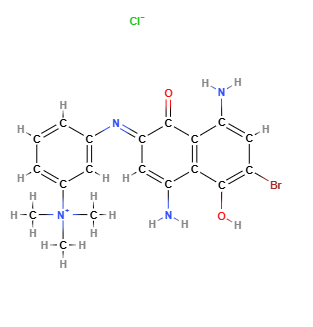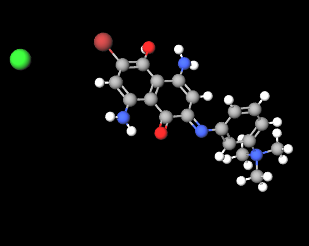Basic Blue 99 is a dye from the naphthoquinoneimine class, primarily used in cosmetic and hair care products such as permanent and semi-permanent hair dyes. It is appreciated for its intense blue hue and ability to bind effectively to hair fibers and other substrates. Known for its color stability and longevity, it is commonly used in combination with other dyes to create a wide range of shades. Basic Blue 99 typically appears as a powder or solution with a dark blue or black-blue color.
Chemical Composition and Structure
The chemical structure of Basic Blue 99 is based on a naphthoquinone system, an aromatic compound containing two ketone groups (C=O) attached to a naphthalene ring, along with an amine (imine) component that contributes to its coloration. The molecule may contain various functional groups and substituents that affect its solubility and ability to interact with hair fibers and other substrates. This dye is water-soluble and can chemically bond to keratin proteins, making it effective for permanent hair coloring.
Physical Properties
Basic Blue 99 appears as a solid powder or granules, soluble in water. The color varies from intense blue to dark blue, depending on concentration and solvent used. Its water solubility allows it to penetrate hair fibers effectively, providing even coloration. At high temperatures, the dye may decompose, releasing by-products that can affect color stability. It exhibits good resistance to light and oxidation, which contributes to its long-lasting color retention.
Production Process
Basic Blue 99 is produced through a series of chemical reactions involving aromatic intermediates, such as naphthoquinone derivatives and amine groups. The process involves a substitution reaction on an aromatic ring, forming an imine bond. The synthesis may include multiple steps to ensure the purity and chromatic efficiency of the dye. Final purification ensures the product is safe for cosmetic use, removing impurities and by-products.
Applications
- Cosmetics: Basic Blue 99 is primarily used in hair dyes, both permanent and semi-permanent. It is particularly valued for its stability and ability to impart blue and black-blue shades to various hair types. It is often combined with other dyes to create custom colors. The dye is used in products such as color-depositing shampoos and pigmented conditioners.
INCI Functions:
Hair conditioning agent. A significant number of ingredients with specific and targeted purposes may co-exist in hair shampoo formulations: cleansers, conditioners, thickeners, matting agents, sequestering agents, fragrances, preservatives, special additives. However, the indispensable ingredients are the cleansers and conditioners as they are necessary and sufficient for hair cleansing and manageability. The others act as commercial and non-essential auxiliaries such as: appearance, fragrance, colouring, etc. Hair conditioning agents have the task of increasing shine, manageability and volume, and reducing static electricity, especially after treatments such as colouring, ironing, waving, drying and brushing. They are, in practice, dispersants that may contain cationic surfactants, thickeners, emollients, polymers. The typology of hair conditioning agents includes: intensive conditioners, instant conditioners, thickening conditioners, drying conditioners. They can perform their task generally accompanied by other different ingredients.
Hair dyeing. It is an ingredient that adds a colouring to the hair that can be temporary, semi-permanent or permanent depending on what other ingredients are added to achieve the result. The pH for hair dyeing is generally between 9 and 10.
Basic Blue 99 is used as a direct hair with a final concentration on the scalp up to 1.0% (1).
Environmental and Safety Considerations
Il parere degli esperti del Scientific Committee on Consumer Safety SCCS nel 2007 (1) :
Basic Blue 99 is a mixture of 23-32 substances of varying concentrations as demonstrated by the HPLC analysis of two batches RS2798801 and 74/75. Due to the highly variable composition of Basic Blue 99 in these batches, the safety of Basic Blue 99 cannot be evaluated.
and subsequent confirmation in 2017 (2):
The SCCS cannot conclude on the safety of Basic Blue 99 (C059) because it is composed of 34 several substances and isomeric forms, with a large variability between the composition of 35 different batches. Also, the toxicological data provided in the previous submission do not relate to the material specifications provided for the current assessment. The safety assessment of Basic Blue 99 will require a clear well-defined set of specifications for the composition of the material intended to be used in cosmetic products as well as supporting toxicological data relating to a representative composition.
Chemical names
Benzenaminium, 3-[(4-amino-6-bromo-5,8-dihydro-1-hydroxy-8-imino-5-oxo-2-naphthalenyl)amino]-N,N,N-trimethyl-, chloride (9CI)
3-[(4-amino-6-bromo-5,8-dihydro-1-hydroxy-8-imino-5-oxo-2-naphtyl)amino]-N,N,N�trimethylanilinium chloride
Molecular Formula C19H20BrN4O2.Cl
Molecular Weight 451.7 g/mol
CAS 68123-13-7
UNII P0U7VBC51E
EC Number 268-544-3
DTXSID60874042
Synonyms:
Jarocol Steel Blue
COLIPA C 059
Arianor Steel Blue
Arianor Steel Blue 306004
Basic Blue 99
C.I. 56059
References__________________________________________________________________________
(1) Cosmetic Ingredient Review Expert Panel. (2007). Final report on the safety assessment of Basic Blue 99. International journal of toxicology, 26, 51-63.
(2) Bernauer, U., Bodin, L., Celleno, L., Chaudhry, Q. M., Coenraads, P. J., Dusinska, M., ... & Wijnhoven, S. (2017). SCCS OPINION ON Basic Blue 99 (C059).
![]() Basic Blue 99
Basic Blue 99 


